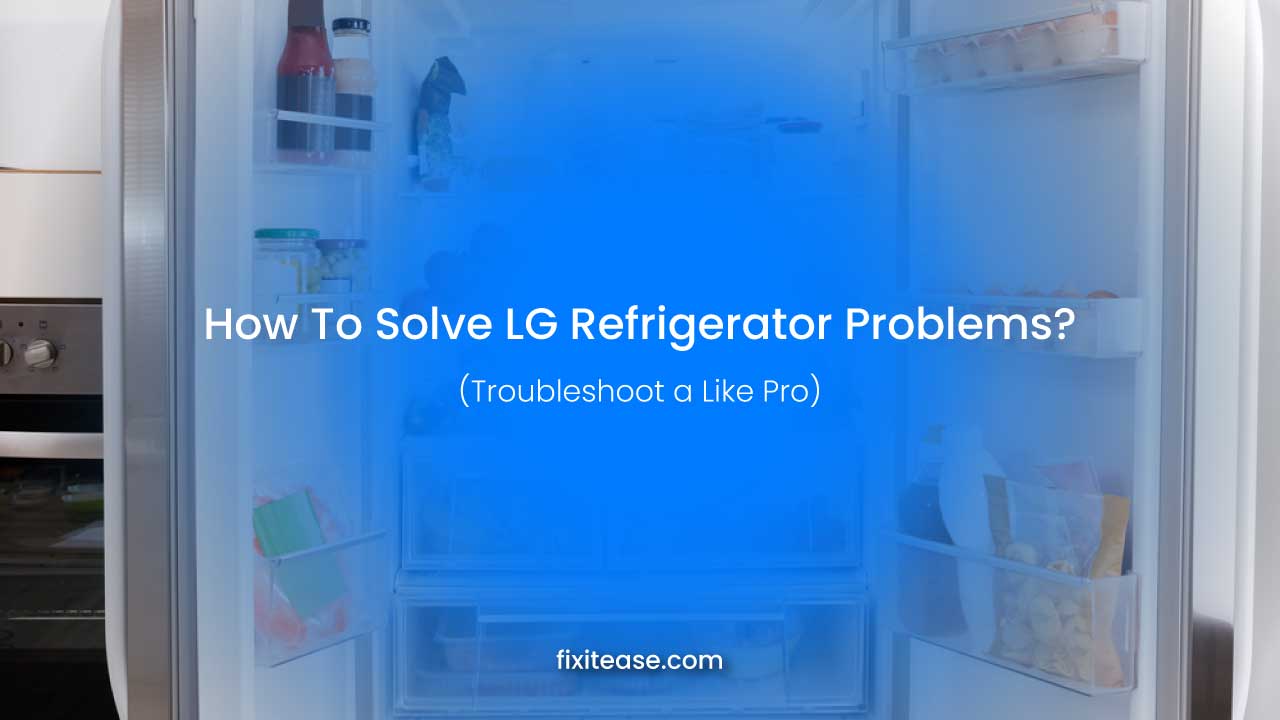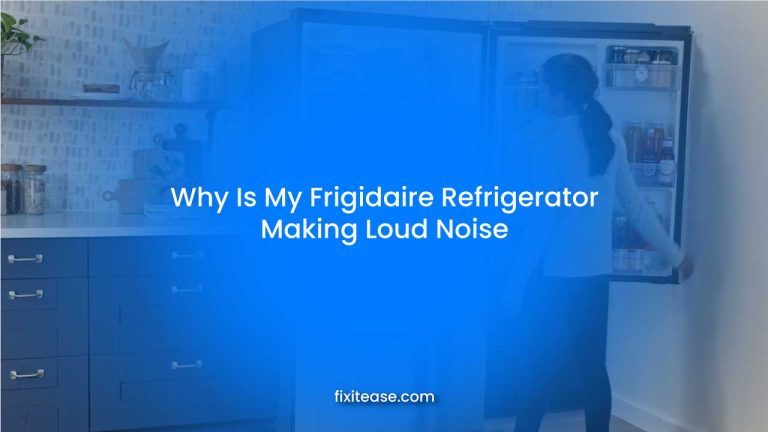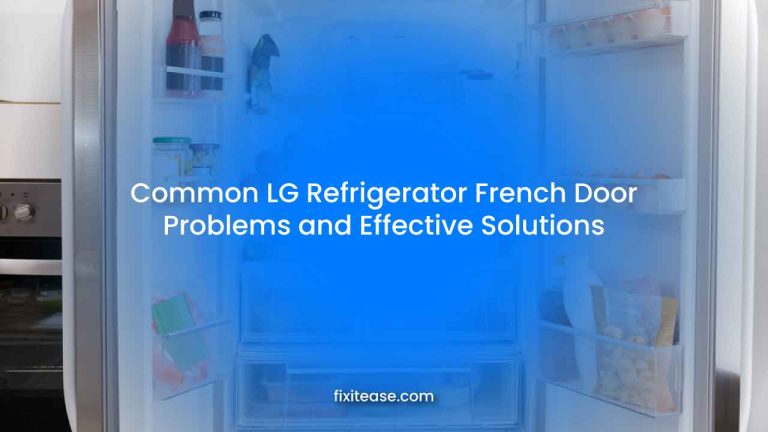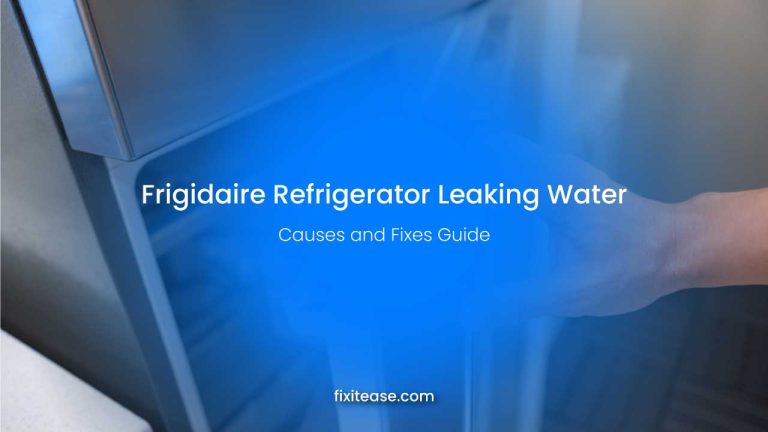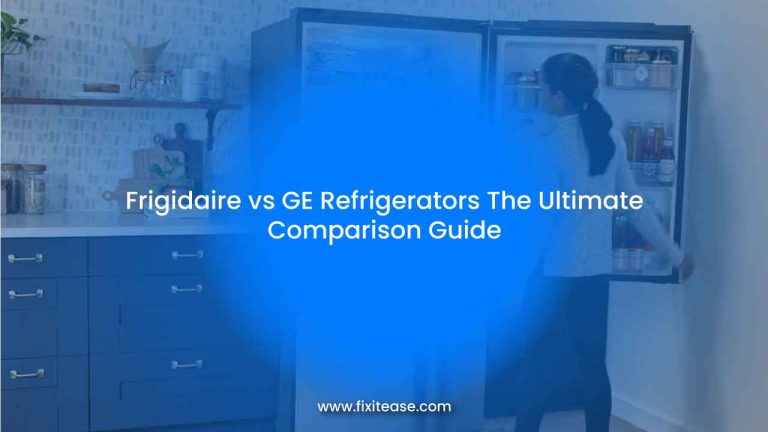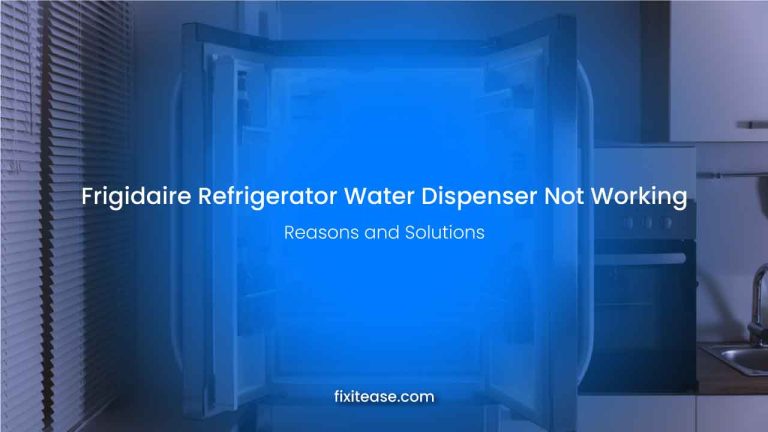Common LG Refrigerator Problems: Here’s How to Fix Them
Owning an LG refrigerator may involve common challenges like compressor malfunctions, condenser motor defects, start relay issues, evaporator fan motor troubles, and water leakage.
Tackle these concerns by recognizing symptoms and exploring potential causes such as a faulty compressor, dirty condenser coils, or a malfunctioning thermostat. Initial steps like cleaning coils and adjusting thermostat settings can be taken.
For persistent issues, professional assistance ensures effective resolution. This guide helps you navigate common LG refrigerator problems for efficient troubleshooting.
How can you perform basic diagnostics on the LG Refrigerator?
If you’re experiencing issues with your LG refrigerator, it’s important to diagnose the problem accurately before seeking a solution. By identifying the symptoms and conducting initial assessments, you can effectively pinpoint common faults and troubleshoot the problem efficiently.
Identify The Symptoms Of The Issue
Before diving into any kind of repair, it’s crucial to identify the symptoms of the problem. Here are a few common symptoms that indicate there may be an issue with your LG refrigerator:
- Food not staying cold or spoiled quickly.
- Excessive noise coming from the refrigerator.
- Water leakage inside or outside the unit.
- Ice maker not producing ice or dispensing water.
- Frost buildup in the freezer.
Initial Refrigerator Assessment
Once you’ve identified the symptoms, it’s time to conduct an initial assessment of your LG refrigerator. Follow these tips to gain a better understanding of the problem:
Check the temperature settings: Ensure that the temperature settings are appropriate for your refrigerator and freezer compartments. Adjust the settings if necessary.
Inspect the condenser coils: Dirty condenser coils can cause cooling issues. Carefully clean the coils using a vacuum cleaner or a brush to remove any dust or debris.
Examine the compressor: A faulty compressor is a common problem that affects the cooling efficiency of the refrigerator. Listen for any unusual noise or vibrations coming from the compressor.
Test the condenser fan motor: The condenser fan plays a crucial role in cooling the compressor and condenser coils. Make sure it is running smoothly and not making any odd sounds.
Verify the evaporator fan motor: The evaporator fan circulates air to ensure proper cooling. Check if it is functioning properly and producing consistent airflow.
How to Pinpoint Common Faults in LG Refrigerators?
After you have completed the initial refrigerator assessment, you can begin to pinpoint the common faults that may be causing the issues. Here are a few common problems associated with LG refrigerators:
| Common Fault | Probable Cause |
| Faulty Compressor | The compressor is responsible for cooling the refrigerator. If it is faulty, the refrigerator may not cool properly. |
| Defective Condenser Motor | The condenser motor assists in cooling the condenser coils. A malfunctioning motor can cause cooling issues. |
| Start Relay Fault | A faulty start relay can prevent the compressor from starting and cause cooling problems. |
| Faulty Evaporator Fan Motor | The evaporator fan motor circulates air inside the refrigerator. A defective motor can lead to inadequate cooling. |
| Leaking Water | Water leakage can be caused by various factors, such as a clogged drain pipe or a faulty water inlet valve. |
If you properly understand these common faults, you can confidently navigate through the troubleshooting process and effectively address the specific issue your LG refrigerator is facing.
It is essential to remember that you can troubleshoot your LG refrigerator like a pro by correctly identifying the symptoms, conducting initial assessments, and pinpointing common faults. In our next article, we will provide comprehensive solutions for each of these common problems, helping you get your refrigerator back in working order.
What Are the Most Common Issues of LG Refrigerator?
Here are some common issues that you might encounter with your LG refrigerator, along with some quick fixes to resolve them. These problems can include temperature inconsistencies, strange noises, water dispenser problems, and ice maker glitches.
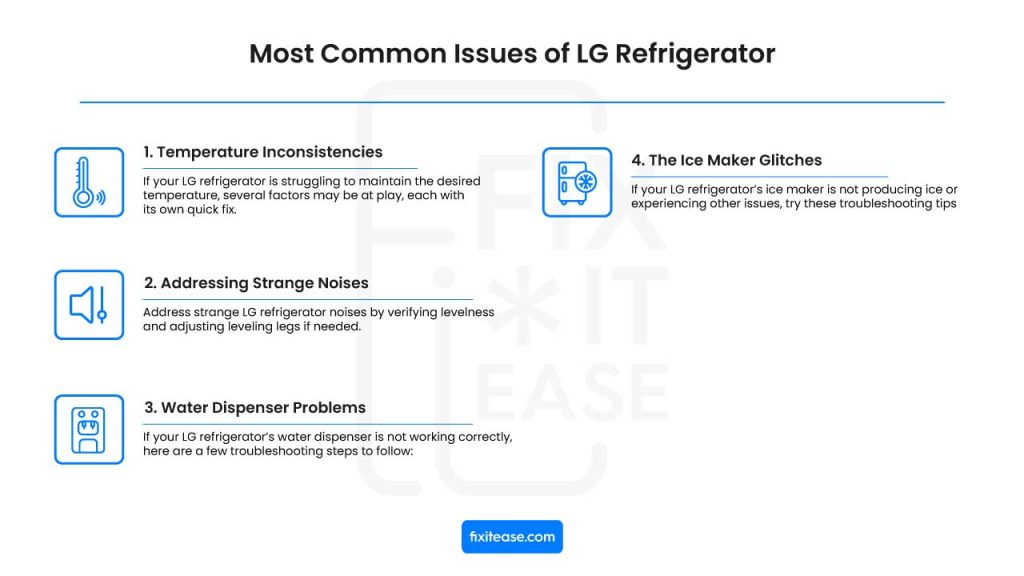
By following these troubleshooting steps, you can potentially save time and money by avoiding unnecessary repairs or service calls.
1. Temperature Inconsistencies
If your LG refrigerator is struggling to maintain the desired temperature, several factors may be at play, each with its own quick fix.
Start by checking the temperature settings to ensure they align with your preferences, making adjustments if necessary.
Additionally, a buildup of dust and debris on the condenser coils could impede their heat release capacity, so regular cleaning is advised for optimal cooling performance.
Finally, inspect the door seal for any damage or wear, as a faulty seal may lead to air leaks and temperature inconsistencies; replace it if needed.
2. Addressing Strange Noises
When faced with strange noises emanating from your LG refrigerator, it’s crucial to pinpoint the source and promptly address the issue. Take these steps into consideration: Verify the levelness of your refrigerator and adjust the leveling legs if necessary.
Inspect the compressor, as a malfunction here could be the culprit, and consider seeking professional assistance for resolution.
Additionally, clear any obstructions that might impede the operation of fans or other moving parts, as these can contribute to noisy operation.
3. Water Dispenser Problems
If your LG refrigerator’s water dispenser is not working correctly, here are a few troubleshooting steps to follow:
Check water supply: Ensure that the water supply line is properly connected and providing an adequate flow of water.
Replace the water filter: A clogged or old water filter can impede water flow. Regularly replace the filter as recommended by the manufacturer.
Inspect the dispenser switch: Test the dispenser switch to ensure it is functioning correctly. Replace it if necessary.
4. The Ice Maker Glitches
If your LG refrigerator’s ice maker is not producing ice or experiencing other issues, try these troubleshooting tips:
- Check the water supply: Make sure the water supply line to the ice maker is connected and providing sufficient water pressure.
- Inspect the water inlet valve: Test the water inlet valve to ensure it is working correctly. Replace it if needed.
- Clean the ice maker: Regularly clean the ice maker to remove any buildup or blockages that might affect its performance.
How to Conduct In-Depth Troubleshooting On LG Refrigerator?
To effectively troubleshoot and fix common issues with your LG refrigerator, it is important to have a thorough understanding of the problem and the specific components involved.
Below, we will provide a detailed guide on compressor checks, step-by-step condenser motor testing, how to assess and repair fan motor issues, and techniques to locate and seal leaks.
By following these troubleshooting techniques, you can extend the lifespan of your refrigerator and save on costly repairs.
Compressor Checks
The compressor in your LG refrigerator plays a crucial role in keeping your food cool and fresh. If the compressor is faulty, it can cause temperature issues and poor cooling performance. To check the compressor, follow these steps:
- Unplug the refrigerator from the power source.
- Locate the compressor, usually at the back of the refrigerator.
- Visually inspect the compressor for any signs of damage or leaks.
- Using a multimeter, test the continuity of the compressor terminals.
- If the continuity reading is within the expected range, the compressor may be functioning properly. However, if the reading is outside the range or there is no continuity, the compressor may need to be replaced.
Step-by-step Condenser Motor Testing
The condenser motor helps dissipate heat from the refrigerator’s condenser coils, ensuring efficient cooling. If the condenser motor is defective, it can result in poor cooling performance. Follow these steps to test the condenser motor:
Unplug the refrigerator from the power source.
Locate the condenser motor, usually behind the refrigerator’s back panel.
Check the motor for any visible signs of damage or obstruction.
Using a multimeter, test the continuity of the condenser motor’s terminals.
If the continuity reading is within the expected range, the condenser motor may be functioning properly. However, if there is no continuity or the reading is outside the range, the motor may need replacement.
Techniques To Locate And Seal Leaks
Leaking water from your LG refrigerator can be a common problem that affects its overall performance. To locate and seal leaks, follow these techniques:
- Inspect the refrigerator’s water supply lines and connections for any signs of leaks.
- Check the refrigerator’s drain pan and drain hole for any clogs or blockages.
- If you suspect a leak from the refrigerator’s water dispenser, inspect the dispenser components and replace any faulty parts.
- Use a flashlight to examine the refrigerator’s interior for any signs of water accumulation or moisture.
- If you identify a leak, clean and dry the affected area, then seal it with appropriate sealant or adhesive.
How To Assess And Repair Fan Motor Issues?
To evaluate and address fan motor issues in your LG refrigerator, start by disconnecting it from the power source. Find the fan motor, typically located behind the freezer compartment, and examine the blades for obstructions or damage. Utilize a multimeter to test the continuity of the motor’s terminals.
If the reading falls within the expected range, the motor may be in good condition. However, if there’s no continuity or an abnormal reading, consider replacing the motor. Additionally, inspect for loose or damaged wires and connections that could impact its performance.
When To Replace LG Refrigerator Filters And Seals?
Knowing when to replace filters and seals in your LG refrigerator is essential for optimal performance. Water filters should be replaced every 6 months or as per the manufacturer’s recommendation to ensure a continuous supply of clean and fresh-tasting water.
Air filters, depending on the model, typically require replacement every 6 to 12 months to maintain proper airflow and prevent unpleasant odors. Keep an eye on door seals, and if you spot any gaps or signs of wear, it’s time to replace them.
Damaged seals can lead to temperature fluctuations and energy loss. Regular replacement ensures your refrigerator functions efficiently.
When To Solve Lg Refrigerator Error Codes?
LG refrigerators use error codes to pinpoint issues for effective troubleshooting. These codes, found in the manual or by contacting support, reveal specific malfunctions. LG refrigerator error codes promptly is crucial for maintaining the appliance’s optimal performance.
Here are common error codes and when to troubleshoot:
| Error Code | Issue | Troubleshooting Action |
| Er 1F or IF | Freezer Ice Buildup | Defrost freezer, check vents, ensure proper airflow |
| Er FF | Freezer Fan Motor Failure | Inspect and replace fan motor |
| Er CF | Condenser Fan Motor Failure | Check and replace condenser fan motor |
| Er CO | Communication Error (Main Board) | Reset refrigerator, seek professional assistance if needed |
| Er dH or DH | Defrost Heater Issue | Inspect and replace defrost heater and thermostat |
| Er rF or Er F5 | Refrigerator Fan Motor Failure | Examine and replace refrigerator fan motor |
| Er 15 or Er 1S or 1F | Ice Fan or Ice Tray Sensor Issue | Check for ice blockages, replace faulty sensor components |
| Er IF | Icemaker Fan Motor Issue | Inspect and replace icemaker fan motor |
Frequently Asked Questions
What Is The Most Common Problem With Lg Refrigerators?
The most common problem with LG refrigerators is a faulty compressor, followed by a defective condenser motor, a start relay fault, and a faulty evaporator fan motor. Another common issue is refrigerators leaking water.
Was There A Recall On Lg Refrigerators?
Yes, there was a recall on LG refrigerators. The recall was due to a faulty component in the condenser fan motor that could short circuit. The recall included LG and Kenmore Elite® Trio™ Three-Door Refrigerators.
How Do I Run Diagnostics On My LG-Refrigerator?
To run diagnostics on your LG refrigerator, use the LG ThinQ® app on your smartphone. It allows for Smart Diagnosis and connects you with LG Customer Support if any issues arise.
What Is The Average Life Of An Lg Refrigerator?
The average life of an LG refrigerator is approximately 9-13 years, depending on the model and usage. Some factors that can affect the lifespan of an LG refrigerator include:
Usage: The more often a refrigerator is used, the more wear and tear it will experience.
Care and maintenance: A refrigerator that is properly cared for and maintained will last longer than one that is not. This includes cleaning the coils regularly, defrosting the freezer as needed, and following the manufacturer’s instructions for use.
Environmental conditions: A refrigerator that is exposed to extreme temperatures or humidity will wear out faster than one that is not.
Model: Some LG refrigerator models are built with more durable parts than others.
If you want your LG refrigerator to last as long as possible, it is important to use it properly, care for it regularly, and keep it in a climate-controlled environment.
Conclusion
If you are facing LG refrigerator problems, it is important to troubleshoot the issues and identify the symptoms. Some common issues include faulty compressors, defective condenser motors, start relay faults, and faulty evaporator fan motors. Additionally, problems with the temperature sensor and dispenser can also occur.

